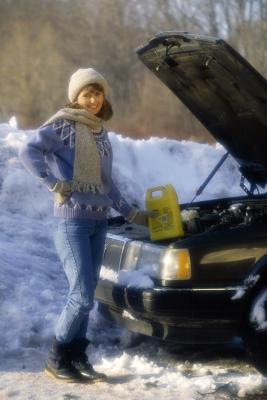
Freezing liquids expand with extreme force according to the laws of physics. The force of this expansion can cause serious damage to pipes and other structures found in RV plumbing systems or automotive cooling systems. Antifreeze solutions are available to prevent damage in cold weather conditions. The type of antifreeze necessary depends on the system, with RVs and cars having significantly different requirements other than freeze protection.
RV antifreeze is usually sold in discount stores or RV dealerships, but is also found in hardware stores or auto parts stores. It is usually pink, and it may be made up of ethanol or propylene glycol, or a mixture of both. RV antifreeze is non-toxic, although you would not want to ingest large amounts of it. Propylene glycol antifreeze is generally preferred to other blends, as it is less likely to leave a taste or smell in RV plumbing systems when used as directed.
Automotive antifreeze is usually made up of ethylene glycol or propylene glycol, along with other chemicals. Automotive antifreeze formulas are differentiated based on their color, as this makes it easy to tell which type is being used. Each vehicle manufacturer has its own requirements for antifreeze. Automotive antifreeze is highly toxic, and can cause death to people or pets if it is ingested, even in relatively small amounts.
Most automotive antifreeze needs to be mixed with water to achieve maximum protection levels and the specified heat transfer properties for the vehicle. The usual ratio of antifreeze to water is one part water to one part antifreeze, but when extreme protection from freezing is needed, the ratio may be as high as 70 percent antifreeze. Some formulas of automotive antifreeze are sold pre-mixed. RV antifreeze is usually not mixed with water, and doing so can weaken its protective properties.
Many varieties of automotive antifreeze are now embittered to discourage animals from drinking the toxic fluid. Dogs will drink large quantities of automotive antifreeze that is not treated with the embittering agents, because automotive antifreeze has a sweet flavor. Be sure to dispose of used antifreeze properly. Some ethanol-based RV antifreeze is flammable. Follow all safety instructions on the label.